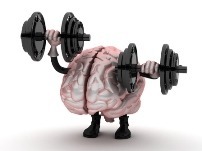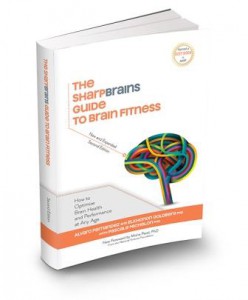Can brain training work? Yes, if it meets these 5 conditions
 In a modern society we are confronted with a wide range of increasingly abstract and interconnected problems. Successfully dealing with such an environment requires a highly fit brain, capable of adapting to new situations and challenges throughout life. Consequently, we expect cross-training the brain to soon become as mainstream as cross-training the body is today, going beyond unstructured mental activity and aiming at maximizing a variety of brain functions. The goal of our new book is to help readers navigate the growing landscape of lifestyle and brain training options to enhance brain health and performance across the lifespan.
In a modern society we are confronted with a wide range of increasingly abstract and interconnected problems. Successfully dealing with such an environment requires a highly fit brain, capable of adapting to new situations and challenges throughout life. Consequently, we expect cross-training the brain to soon become as mainstream as cross-training the body is today, going beyond unstructured mental activity and aiming at maximizing a variety of brain functions. The goal of our new book is to help readers navigate the growing landscape of lifestyle and brain training options to enhance brain health and performance across the lifespan.
How is brain training different from mental stimulation?
Anything we do involving novelty, variety, and challenge stimulates the brain and can contribute to building capacity and brain reserve. For instance, learning how to play the piano activates a number of brain functions (attention, memory, motor skills, etc.), which triggers changes in the underlying neuronal networks. Indeed, musicians have larger brain volume in areas that are important for playing an instrument: motor, auditory and visuospatial regions. However, we need to recognize that such an activity may take thousands of hours before paying off in terms of brain fitness. It constitutes a great and pleasurable mental effort, and helps build cognitive reserve, but it is different by nature from more targeted, efficient, and complementary brain training interventions. To take an analogy from the world of physical fitness, it makes sense to stay fit by playing pickup soccer games AND also by training specific muscle groups and capacities such as cardio endurance, abdominal muscles, and thigh muscle. It is not one or the other.
Under what conditions can brain training work?
This is the million dollar question. Evidence is growing that some forms of brain training can work, especially when based on cognitive training, cognitive behavioral therapy, meditation and/ or biofeedback. The question remains, however, how to maximize the likelihood of transfer from training to daily life.
Why do we still often hear that brain training does not work? Because of the different understandings of what “brain training” and “work” mean. A machine to train abdominal muscles probably won’t “work” if what we measure is blood pressure. A “plane” won’t fly if it wasn’t a plane to start with, but a donkey.
The most critical factor in determining whether a brain training method or program works is the extent to which the training effects “transfer” to benefits in daily life. We know from common experience that practice usually triggers improvement in the practiced task. Based on our analysis of dozens of documented examples of brain training techniques that “work” or “transfer,” we propose that these five conditions must be met for any kind of brain training, from meditation to technology-based programs, to translate into meaningful real world improvements:
- It must engage and exercise a core brain-based capacity or neural circuit identified to be relevant to real-life outcomes, such as executive attention, working memory, speed of processing and emotional regulation, as well as others discussed throughout the interviews with scientists in this book. Many supposed “brain training” games fail to provide any actual “brain training” because they were never really designed to target specific and relevant brain functions.
- It must target a performance bottleneck – otherwise it is an exercise in vanity similar to building the largest biceps in town while neglecting the rest of the body. A critical question to ask is: Which brain function do I need to optimize? With physical fitness, effective training begins with a target in mind: Is the goal to train abdominal muscles? Biceps? Cardio capacity? So it goes for brain fitness, where the question becomes: Is the goal to optimize driving-related cognitive skills? Concentration? Memory? Regulating stress and emotions? The choice of a technique or technology should be driven by your goal. For instance, if you need to train your executive functions but use a program designed to enhance speed of processing, you may well conclude that this program does not “work.” But this program may work for somebody whose bottleneck is speed of processing (as often happens in older adults).
- A minimum “dose” of 15 hours total per targeted brain function, performed over 8 weeks or less, is necessary for real improvement. Training only a few hours across a wide variety of brain functions, such as in the “BBC brain training” experiment, should not be expected to trigger real-world benefits, in the same way that going to the gym a couple times per month and doing an assortment of undirected exercises cannot be expected to result in increased muscle strength and physical fitness.
- Training must adapt to performance, require effortful attention, and increase in difficulty. This is a key advantage of computerized “brain training” over pen-and-paper-based activities. Think about the number of hours you have spent doing crossword or Sudoku puzzles, or mastering any new subject for that matter, in a way that was either too easy for you and became boring or way too difficult and became frustrating. Interactive training has the capacity to constantly monitor your level of performance and adapt accordingly.
- Continued practice is required for continued benefits. Just as you wouldn’t expect to derive lifelong benefits from running a few hours this month, and then not exercising ever again, you shouldn’t expect lifelong benefits from a one-time brain training activity. Remember that “cells that
 fire together wire together” – while the minimum dose described above may act as a threshold to start seeing some benefits, continued practice, either at a reduced number of hours or as a periodic “booster,” is a final condition for transfer to real-world benefits over time.
fire together wire together” – while the minimum dose described above may act as a threshold to start seeing some benefits, continued practice, either at a reduced number of hours or as a periodic “booster,” is a final condition for transfer to real-world benefits over time.
–This is an adapted excerpt from the new book “The SharpBrains Guide to Brain Fitness: How to Optimize Brain Health and Performance at Any Age” (April 2013; 284 pages). This user-friendly and thought-provoking how-to guide cuts through the clutter of media hype about the latest “magic pill” for better brain health, offering proven, practical tips and techniques that anyone can use to maintain and enhance brain function throughout life and even ward off cognitive decline.



I’m sorry but I disagree with several of these criteria. Combat Brain Training is the only program of its kind vetted and approved by US Special Operations Command and has produced real world improvements in cognitive performance in as little as 3 hrs. That’s how long it took for a surgeon to reduce the required time for a surgery from 6 hours to less than 2, and a young girl with LD to remember her math formulas and raise her grades significantly. The key is not to isolate a specific issue, but target all areas of the brain. This way weaker mental processes are improved but so are stronger ones that no longer have to compensate for the weak ones.
Hello John, frankly it’s not a matter of agreeing or disagreeing, but of taking a deep look at the available evidence. We analyzed hundreds of well-published randomized controlled trials, trying to find key differences between those which showed transfer from training to real-world outcomes vs. those which didn’t, and those 5 key “conditions” represent what we found. I’m sure we’ll refine them as more rigorous studies are conducted — I invite you to share specific references so we can add them to our analysis, and to conduct/ finance/ participate in independent and high-quality trials so we can better understand what’s going on and how more people can benefit. Regards
This is great; thank you for posting. Particularly interesting was the fact that training must involve focused attention and prolonged hours of training. However, wouldn’t long sessions of training result in temporary reduction of cognitive performance and output? Thanks